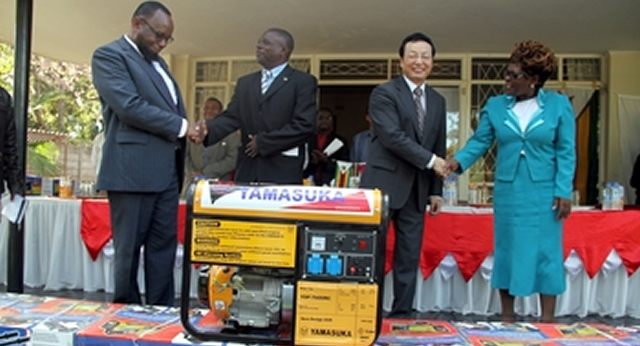Govt, brokers agree on demutualisation

 Happiness Zengeni Business Editor—
Happiness Zengeni Business Editor—
Government and stockbrokers have agreed in principle, subject to cabinet approval, on the equity structure to be followed when the Zimbabwe Stock Exchange is demutualised. Demutualisation is the process through which any member-owned organisation becomes a shareholder-owned company.
According to the agreement, Government and stockbrokers will have a 40:60 goodwill equity structure pre-demutualisation based on a valuation of $5 million.
After demutualisation stockbrokers will own 34 percent of the exchange and Government 16 percent. A further $5 million will be raised through initial public offering (at $3 million) for 30 percent stake and $2 million for private placement for a 20 percent shareholding.
Finance and Economic Development Minister Patrick Chinamasa said yesterday he had reached common understanding with stockbrokers over demutualisation of the ZSE following “cordial engagement”.
The meeting was attended by stockbrokers, Government through the Finance Ministry, the Securities and Exchange Commission and the ZSE.
Minister Chinamasa told The Herald Business that Government acknowledged it had not contributed any money to the affairs of the stock exchange since 1946 but because it was a statutory body, it should have a stake post demutualisation.
“This is just to provide the necessary leadership and regulation.”
According to historical narrations, the ZSE was formed in 1945 by a group of Stockbrokers and businessmen in Bulawayo who put up capital in return for shares in the Stock Exchange. The shares were referred to as Proprietary Rights (as they gave the holder the right to be a part proprietor or owner of the Stock Exchange).
From 1945 to present day the equity capital of the Zimbabwe Stock Exchange has been held against the Proprietary Rights which are currently held entirely by Stockbrokers (members of the Zimbabwe Stock Exchange).
The Exchange was to be run as a mutual society in perpetuity. This was first captured in Section 3; Section 5(i); Section 6 and Section 8 of the Rhodesia Stock Exchange Act of 1974 and similarly carried in subsequent versions of the same Act.
Although section 119 of the Securities Act (chapter 24:25) repealed the ZSE Act, (chapter 24:18) section 121 of the Securities Act contained the following provision that “Section 121 (2) of the ZSE as established by Section 3 of the repealed Act, shall continue as a body corporate and subject to this section, shall be deemed to be a registered securities exchange”.
As at June 30, 2013 the ZSE was valued at $5 million on a going concern basis.
The stockbrokers said given the active role they have played over the years such as going on road shows; investing in research and continuously lobbying over the years for a better market, they are entitled to 60 percent of the goodwill.
“Members propose an allocation of 40 percent of the goodwill to the Government on the basis that they have been passive in the build-up of the current goodwill while it has benefited from activity generated by members in the form of the taxes and levies that have been charged on traded turnover,” reads part of the stockbrokers’ position paper.
The split of goodwill on the basis of 40 percent to Government and 60 percent to members yields a shareholding structure entitling members of the ZSE to 68 percent of the ZSE and the government to 32 percent of the ZSE.
“It is our proposal therefore to split equity in the ZSE on this basis at demutualisation.”
Based on the same valuation, brokers will own 34 percent of the exchange, Government 16 percent, IPO funds (at $3 million) 30 percent and 20 percent ($2 million) for private placement, bringing the total capital to $10 million.
The 20 percent earmarked for private placement is intended to attract a strategic partner for the ZSE.
Minister Chinamasa said a technical partner would only be sought with respect of management of the exchange not for ownership.
Minister Chinamasa said the IPO funds will be mobilised from the general public including institutional investors like NSSA and the various pension funds that have always participated on the ZSE.
Globally, the first stock exchange to demutualise was the Stockholm stock exchange in 1993. Today, all major stock exchanges around the world such as exchanges in India, Malaysia, Hong Kong, Singapore, Japan, Germany, Australia, USA and UK operate as demutualised exchanges.










Comments